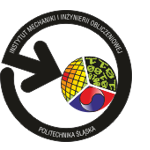 |
Department of Computational Mechanics and Engineering |
 |
Programming for Industrial Applications
Field of study: Mechatronics
Programme: Mechatronic systems engineering (ME8)
Semester: II
ECTS credits: 2
Course instructor: dr inż. Łukasz Turchan
Course description
Computer engineering and programming is integral part of a multidisciplinary field of engineering, namely mechatronics. Controlling the nuclear power plant, design of a constructions and optimization of sensors, illustrate the scale of the problems where the programming is used. The purpose of the course is the acquisition by the student the ability to programming of automatic control systems based on microprocessors, microcontrollers or programmable logic controllers (PLCs).
After completing the course, students should:
Course contents
Teaching modes and hours
Sources
Programme: Mechatronic systems engineering (ME8)
Semester: II
ECTS credits: 2
Course instructor: dr inż. Łukasz Turchan
Course description
Computer engineering and programming is integral part of a multidisciplinary field of engineering, namely mechatronics. Controlling the nuclear power plant, design of a constructions and optimization of sensors, illustrate the scale of the problems where the programming is used. The purpose of the course is the acquisition by the student the ability to programming of automatic control systems based on microprocessors, microcontrollers or programmable logic controllers (PLCs).
After completing the course, students should:
- have knowledge about role of different programming paradigms in configuring/managing systems,
- be able to choose the programming language and implement software systems for industrial automation,
- to know the basic assumptions of programming for industrial applications.

Course contents
- Automated systems theor
- Machine code and procedural languages
- Declarative programming
- Technical proficiency in advanced techniques in different programming paradigms
- Industrial data transmission protocols
- Digital Signal Processing/DSP Programming
Teaching modes and hours
- 15 h lectures
- 45 h projects
Sources
- Gabbrielli M., Martini S., Programming Languages: Principles and Paradigms, Springer, 2010
- Krupali S., Learning Gear: Microprocessor, Microcontroller and PLC, Learning Tool of Programming, LAP LAMBERT Academic Publishing, 2012
- Dorf R.C., Bishop R.H., Modern Control Systems, Upper Saddle River, 2008
- K. Williston et al., Digital Signal Processing, World Class Designs, Elsevier, 2009.
- Harpr R., Practical Foundations for Programming Languages, Cambridge University Press, 2012